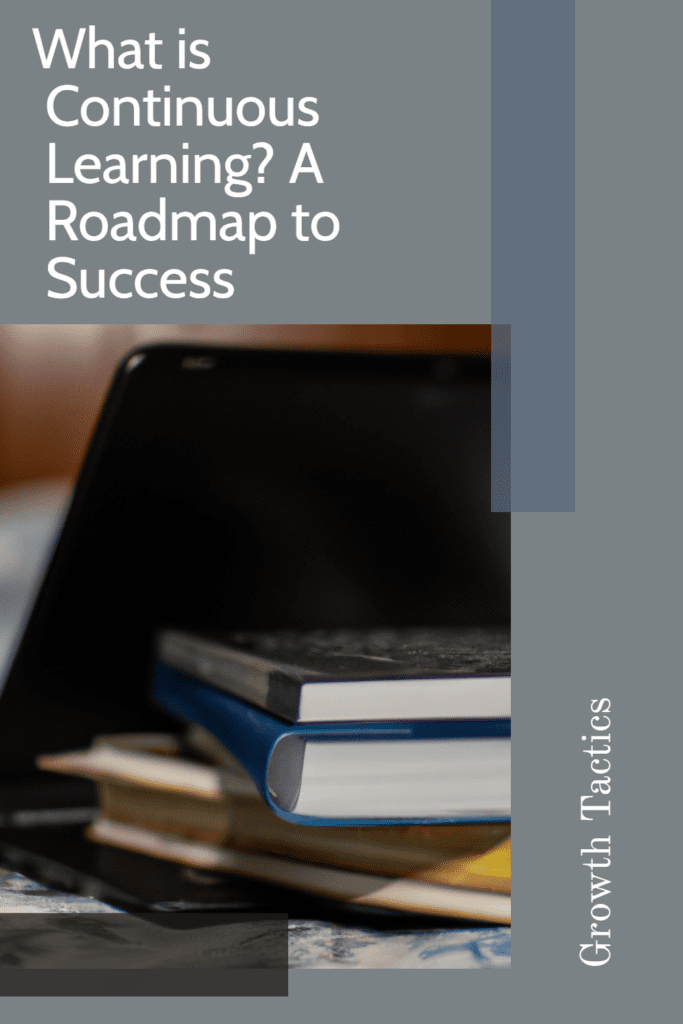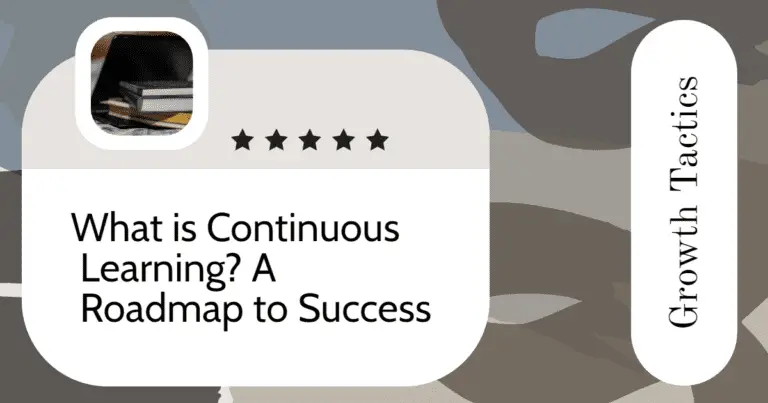Are you ready to take your personal and professional growth to the next level? If so, continuous learning is a must!
Continuous learning is about always gaining new skills and knowledge. It’s also about improving what you already know. Some call it lifelong learning. Others might say constant learning or continual learning.
By embracing continuous learning, you can expand your horizons, discover new interests, and gain fresh perspectives. You’ll also improve your job performance, stay relevant in your industry, and advance your career.
Jump To Section
The Power of Continuous Learning
Continuous learning is a game-changer for both people and businesses:
For Individuals
Continuous learning helps you adapt to changing demands in your work and life. It keeps you curious and open-minded. It also helps you fight complacency.
Think about the challenges you face every day. When you keep learning, you grow to meet those challenges. Your path is unique. Embrace it and learn with purpose.
For Businesses
Continuous learning keeps employees engaged and interested. It boosts their skill retention and performance. It also shows employees that they are valued.
A good leader knows that investing in people is key. When you promote learning, your team grows stronger. Encourage unique solutions. Learn with purpose. Grow every day.
Benefits of Continuous Learning
Continuous personal and professional development is critical to a successful life and career. Here are some of the key advantages:
- Improved job performance and career advancement: By continuously learning, you can stay updated with the latest industry trends, technologies, and best practices, which can lead to better job performance and ultimately, career development.
- Enhanced personal skills and knowledge: Continuous learning provides an opportunity to explore new interests, expand your knowledge, and develop new skill sets. This can help you become a more well-rounded individual and enhance your personal life.
- Increased adaptability and resilience in a changing world: In today’s fast-paced world, change is constant. Continuous learning can help you stay adaptable and resilient in the face of change, allowing you to navigate new challenges with confidence and ease.
Overall, continuous learning is a powerful tool that can help you achieve your personal and professional goals while also preparing you for the challenges of the future.
Types of Continuous Learning
Continuous learning is essential. It comes in many forms. Let’s break it down:
Formal Education and Training
Formal education is the classic route. Imagine enrolling in a structured program. You earn a degree, diploma, or certification when you finish. This type of learning provides a solid foundation for new knowledge and skills.
It prepares you for a specific career path. Plus, you get great opportunities to network and gain practical experience through internships or co-op programs.
Informal Learning
Informal learning is all about self-direction. Think about diving into books, podcasts, and online resources. You can learn outside the classroom. Tailor it to your interests and pace.
The internet has tons of resources. Learn new skills or deepen your knowledge on a topic. Informal learning is affordable and flexible. Perfect for personal growth.
Volunteering
Volunteering is unique. It offers hands-on experience and expands your network. Choose causes or organizations that matter to you. Develop new skills and competencies while giving back.
Volunteering provides a sense of purpose. It feels fulfilling and supports personal growth. Plus, it opens doors to networking and practical experience.
Mentors and Communities
Mentors and communities are invaluable. A mentor has more experience and knowledge in a specific field. They offer advice and feedback. They help you navigate your path.
Communities, like professional associations or online forums, are great for networking and sharing knowledge. Finding support in these spaces keeps you motivated and engaged in continuous learning.
Remember, your learning journey is unique. Embrace it, and keep learning with purpose. Every step you take is a step toward growth.
Overcoming Obstacles to Continuous Learning
We’ve already discussed how continuous learning is an essential part of personal and professional development, but many obstacles can get in the way. These include difficulties with time management and prioritization, maintaining motivation and discipline, and overcoming fear of failure and self-doubt.
To overcome the challenge of time management and prioritization, you need to create a schedule that balances your different responsibilities. Setting realistic goals and breaking down larger tasks into smaller, more manageable steps can also help you stay on track.
Maintaining motivation and discipline is crucial for continuous learning, and you can achieve this by setting achievable goals, rewarding progress, and finding an accountability partner to keep you focused.
Overcoming fear of failure and self-doubt requires changing negative thoughts and beliefs. You can achieve this by reframing negative self-talk, seeking support from mentors or community groups, and focusing on the benefits of learning rather than on the potential risks.
By implementing these strategies and seeking support from others, you can overcome obstacles to continuous learning and achieve your personal and professional goals.
Practical Tips for Continuous Learning
Stay curious and open-minded: An essential aspect of continuous learning is to stay curious and open-minded. Embrace new ideas, and challenge yourself to learn new things every day. This can help you stay engaged and motivated to learn.
Seek out diverse learning experiences: Broaden your horizons by seeking out diverse learning conferences, and seminars to learn topics outside your field of expertise. This can help you gain new perspectives and fresh ideas.
Embrace failure as an opportunity to learn: Failure is a natural part of the learning process. Embrace it as an opportunity to learn and grow. Analyze what went wrong, and use that knowledge to improve your approach in the future.
Collaborate with others and seek feedback: Collaborating with others can help you learn new perspectives and build new skills. Seek feedback from peers, mentors, and experts in your field. This can help you identify areas for improvement and gain insight into how you can grow and develop.
Celebrate small successes along the way: Celebrate your accomplishments, no matter how small they may be. Recognize your progress and reward yourself for your efforts. This can help you stay motivated and engaged in the learning process.
Finding Support for Continuous Learning
Join professional organizations and networking groups: Professional organizations and networking groups provide valuable opportunities to connect with others in your field and gain insights into industry trends and best practices. Participating in these groups can also help you build your professional network and find new learning opportunities.
Connect with mentors and coaches: Mentors and coaches can provide guidance, support, and valuable feedback as you pursue your learning goals They help you identify areas for improvement, develop new skills, and overcome challenges that may arise along the way.
Engage with online learning communities and forums: Online learning communities and forums provide a platform to connect with like-minded individuals, share knowledge, and learn from others. These communities can offer valuable resources, such as articles, to stay up-to-date on the latest trends and best practices in your industry.
Build a support system of friends and family: Building a support system of friends and family can provide emotional support, encouragement, and motivation as you pursue your learning goals. Share your goals and progress with loved ones, and seek their support and feedback as you work towards your goals.
Continuous Learning Roadmap
Here is a roadmap for continuous learning:
- Set Goals: Start by identifying what you want to learn and what skills you want to develop. This will help you stay focused and motivated throughout the learning process.
- Choose Your Learning Path: Determine the best way for you to learn based on your goals, learning style, and schedule. There are many options, including traditional classroom learning, online courses, books, podcasts, and more.
- Create a Plan: Create a plan that outlines the steps you need to take to achieve your learning goals. This may include setting aside time each day or week for learning, identifying resources you will need, and tracking your progress.
- Take Action: Start learning! Begin by reading or watching relevant material, attending classes, or practicing your new skills.
- Seek Feedback: Seek feedback from others to help you identify areas where you can improve and ways to refine your skills.
- Reflect: Take time to reflect on what you have learned and how you can apply it in your personal and professional life.
- Adjust and Repeat: Use what you have learned to adjust your goals and learning plan as you go. Continuously repeat the cycle of learning, reflecting, adjusting, and repeating to achieve ongoing growth and development.
Conclusion
In conclusion, a continuous learning culture is crucial for personal and professional growth. By staying curious, seeking out new knowledge, and developing new skills, we can stay relevant in our industries and become more well-rounded individuals.
The benefits of continuous learning are numerous, including increased job satisfaction, career advancement, and personal fulfillment.
It’s never too late to start the journey towards lifelong learning, and there are many resources available to help us along the way. So, I encourage everyone to take action and commit to their own learning journey. With determination and a thirst for knowledge, anything is possible.
Did you enjoy this article on continuous learning? Please share and subscribe below.


